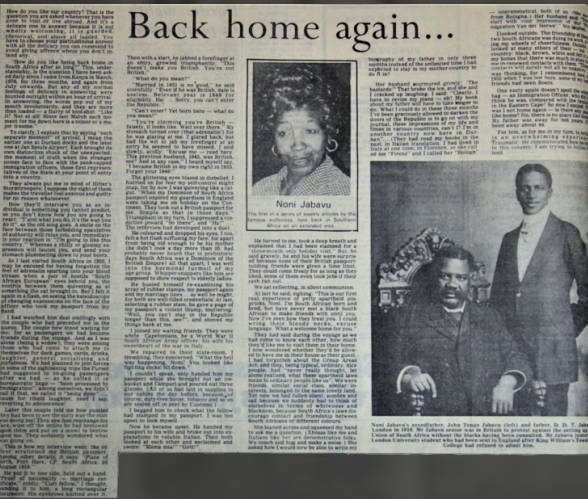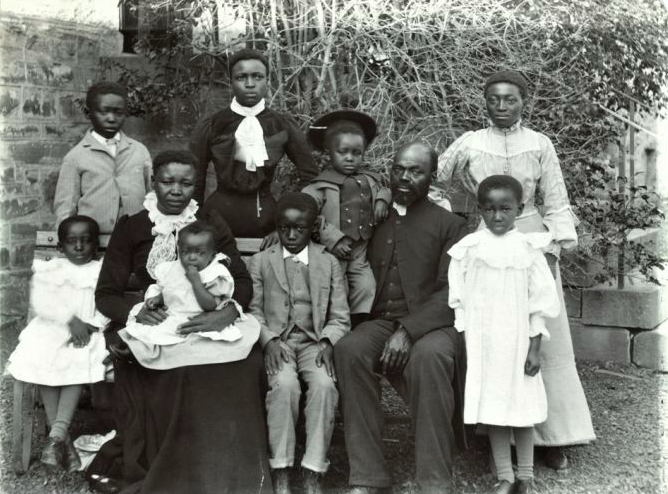In 2018, the chief curator at the Johannesburg Art Gallery, Khwezi Gule, curated, “All Your Faves are Problematic”, an exhibition intended to provoke different ways of thinking about South African modern and contemporary art. The press release notes:
For the most part, South African modern and contemporary art is treated with some kind of reverence and an uncritical attitude. It is also treated as if it is above the contemporary social and political contestations that are evident in South African public discourse.
It might seem odd to begin contemplating Noni Jabavu’s literature through the lens of ‘modern and contemporary art’, however, I am drawn to Gule’s statement as it calls on us to critically engage the work of those we encounter as pioneers and trailblazers in their fields. For much of her life, Noni Jabavu was indeed excluded from the suite of vanguards of artistic expression, but in recent years a lot of work has been done by Black women such as Makhosazana Xaba, Athambile Masola and Virginia Phiri (among others) to make her work known. Her work and her biography are currently read within the canon of trailblazing local and international writers of nonfiction.
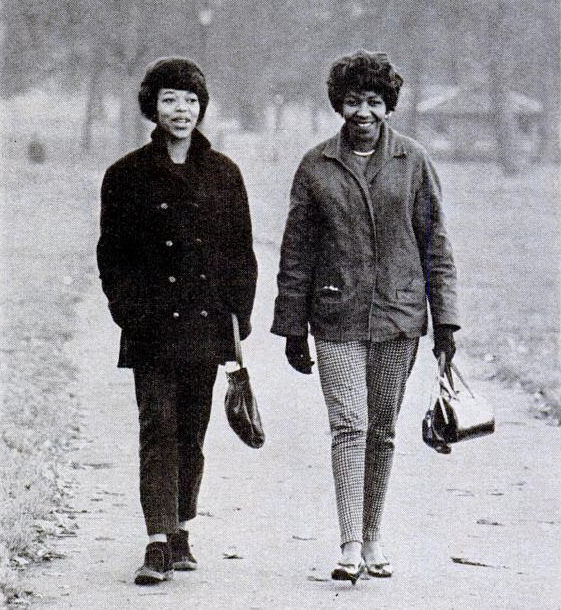
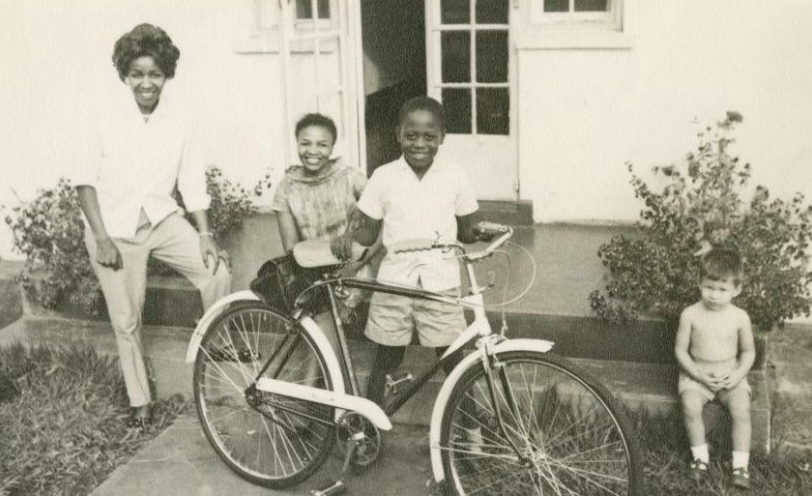
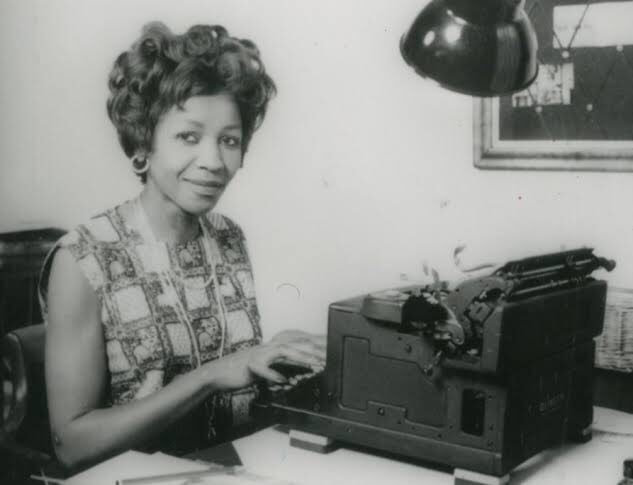
I started to hear about Noni Jabavu before I had a chance to read anything she had written – through snippets in media and conversations with friends – and so, I was excited to pick up the recently published Noni Jabavu: A Stranger at Home. The book is beautiful, as an object. Introduced by Makhosazana Xaba and Athambile Masola, it brings together Jabavu’s columns written for the Daily Dispatch newspaper in 1977, with a selection of evocative images of the writer at different stages of her life — here’s Noni dressed elegantly in a studio in London, here she is walking the streets of London in 1947, here she is enjoying herself with friends in Kingston and there she is in Uganda exploring the great outdoors.
In 1977, columnist Peter Kenny penned a letter welcoming Noni home and introducing her to readers of the Daily Dispatch. Kenny describes Noni as a “remarkable woman with laughing, oak-coloured eyes, who was an oxy-acetylene welder during World War II and is now famous for her writing”. And remarkable she is. A pioneer in writing, broadcasting and even filmmaking.
Jabavu was born in 1919 in the Eastern Cape where she lived until the age of thirteen when her parents sent her to Britain to study. She was the first Black person to work as editor of a literary magazine in England, where she began her career as a freelance writer and journalist for the BBC. Noni was well-travelled and lived in many parts of the world – including Mexico, Kenya, Jamaica and Uganda, among others. She authored the book Drawn in Colour: African Contrasts (1960) and her most famous title, The Ochre People: Scenes from a South African Life (1963).
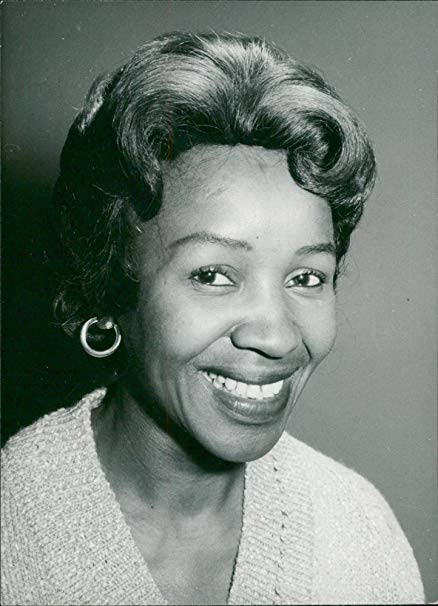
At this point, I have to return to my introduction of problematic faves, because the more I read Jabavu’s reflections the more problematic I find her. I recognise the extraordinary life that she has led but where others find insight, wit and charm, I find displeasure. Throughout her columns, I find a kind of obsession with class, delivered with a tone nothing short of prescriptive (scathing even). And of course, class is entangled with race, and she knows this — her columns are written in 1977, confronting an emboldened apartheid state and an angry Black mass, at the height of the Black Consciousness Movement. She is aware of how, as she puts it: “accidents of birth have produced people like me, middle class, indeed upper class, for five black generations here in South Africa. Landowners, politicians, educationists, lawyers, doctors and writers.”
What are the implications of the existence of such an upper class and how do they move through the world? Now, I have to pause here, because the task of quoting a writer out of context to prove a point is also problematic. This is a good moment to note that my reading of Jabavu’s 1977 Daily Dispatch columns is without a full grasp of early and mid-20th-century writing on race and class by Black authors. I have no insight into the tenor and tone used by other ‘upper class’ Black writers of this time to describe their conditions and so I shall keep a critical yet open attitude.
From commentary on Transkeian and Ciskeian women’s habit of wearing bedroom slippers outside, her reflections on Mexican peasants who don’t read — she’s also suspicious of Black people who keep textbooks in dusty cupboards as reading material — to stories about her maid named “Zeegums” who “liked to lie at my feet under the dining table”, “sexually arousing” (her words, not mine) ochre women of the Transkei who walk beautifully in “their costumes” or stories about her white lover whom she lovingly refers to as her vanilla gorilla – ”that big blonde bully of mine!” Noni Jabavu is nothing short of complex.
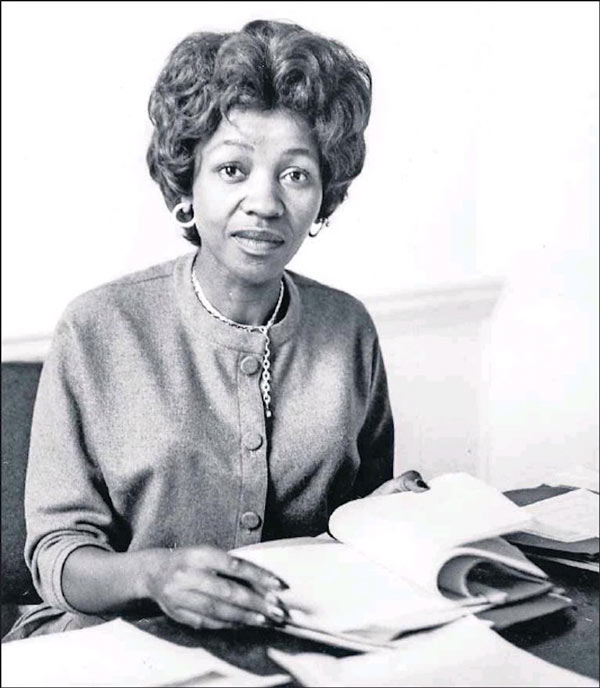
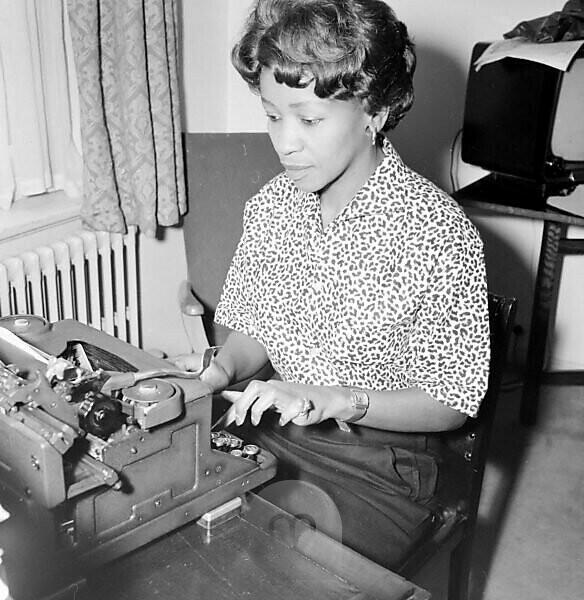
There’s a passage, on page 74, in a column titled “Why don’t our blacks read?” published on the 23rd of March 1977, which I have to quote extensively to allow for better context.
Noni writes: “What do I find now, more than 40 years on? No reading of books; conversation utterly desultory, puerile…’Ninjani?’ How is everyone here at Home?’ ‘Hayi, sikho. Ninjani nina? No, we are all right. How are yourselves?’ ‘Oh, ewe, sikho, sihamba nazo. Oh, yes, we are alive, we go along with our problems (these coughs and colds)’… for minutes on end punctuated by stagnant silences, eyes avoiding other eyes and gazing at the mealie patch outside the front door.” She continues: “Is this non-communication possibly because I speak too directly, like a ‘European-of-the-Water’? …I am not accustomed to this black people’s beating about the bush, this devious conducting of non-conversations about health/impilo, drought, rainfall, any real ‘meat of the brain’ being studiously avoided.”
Here, not only is Jabavu offensive but she’s also wrong. What she refers to as “black people’s beating about the bush” is a powerful mode of relating that slows time, that renders time irrelevant. This is a mode of communicating that prioritizes a deep and slow relationality through careful, calculated, and often creatively employed pause, hesitation and non-sound as meaning is conveyed.
Noni herself (in this same column) warns readers that “chauvinism is bad in every way” and that “it is so ingrained that it can take time, intelligence, much thought and self-analysis to get rid of.”
And so here I am in 2023, reading Noni Jabavu, excited about the possibility of the recovery of Black women’s work but also wondering what this kind of writing does. I want to stress that my discomfort is not just a matter of taste but a grappling with a politic and philosophy that makes it difficult (and notice I did not say impossible) to hold the content of Jabavu’s writings (at least in these columns) against the politics of care that engender the kind of feminist labour that works to unearth histories and obliterate patriarchal, gendered and racialized erasure. I have to ask, who is Noni to me? And how should I receive her views and attitudes?
